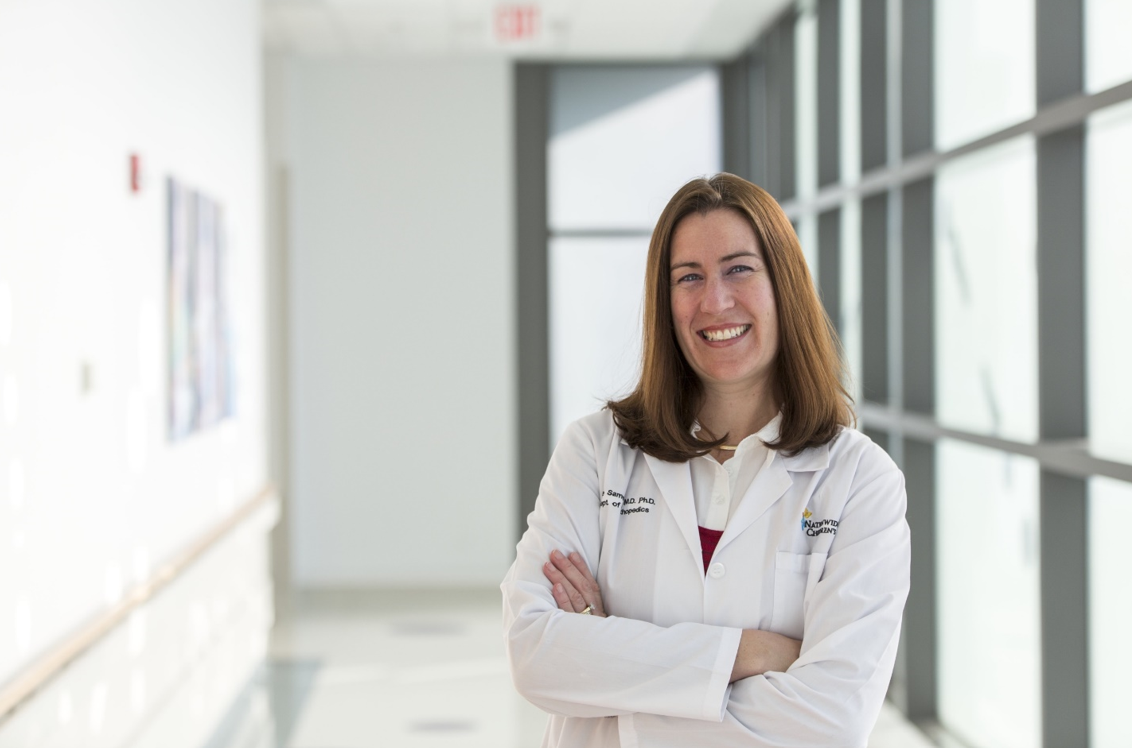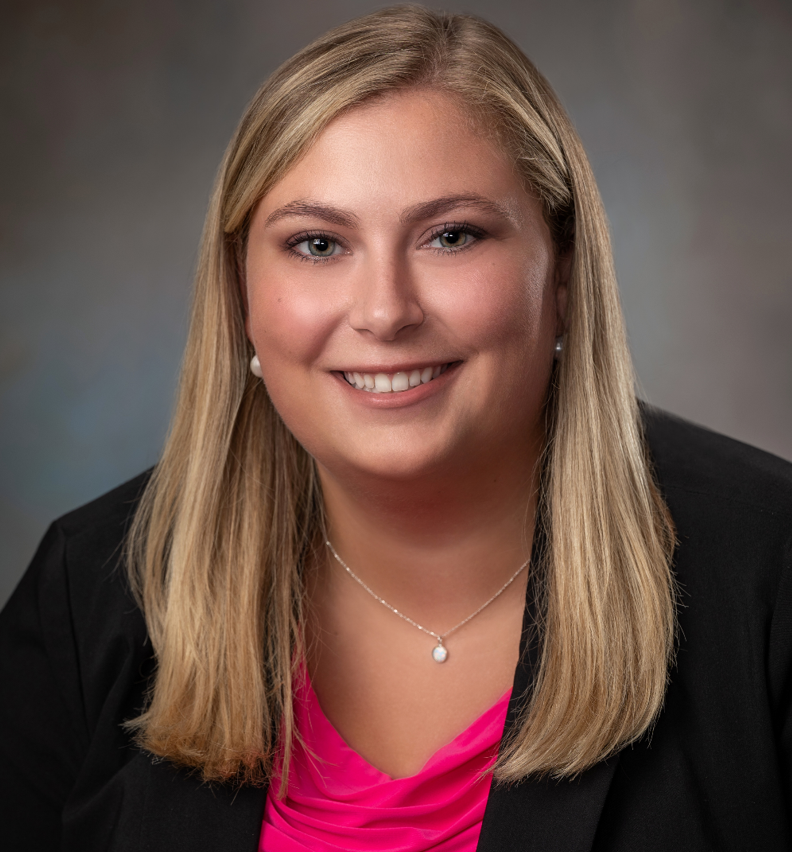
Dr. Julie Samora is a pediatric hand surgeon at Nationwide Children's Hospital in Columbus, OH, where she is Associate Chief Quality Officer and director of quality improvement within the department of orthopaedics. She received her orthopaedic training at Ohio State University and completed a fellowship in hand and upper extremity surgery at Harvard. She earned a Bachelor of Fine Arts at Carnegie Mellon University, a Master of Music at Yale University, and an MD/PhD at West Virginia University, where she concomitantly earned a master of public health and public administration. Dr. Samora is a founding member of Pride Ortho, has previously served on the Board of Directors of the Ruth Jackson Orthopaedic Society (past president) and the Pediatric Orthopaedic Society of North America (member-at-large), and is currently on the BOD of the American Academy of Orthopaedic Surgeons. She has published more than 150 peer-reviewed manuscripts and is co-editor of the Springer textbook: Quality Improvement and Patient Safety in Orthopaedics. Dr. Samora has a passion for providing safe, efficient, culturally sensitive, and excellent patient care, focusing on best practices and quality improvement initiatives.
Could you tell us how you discovered your interest in surgery, specifically, pediatric orthopaedic surgery?
Since childhood, I always knew I was going to be a surgeon, but I wasn't sure what kind of surgery. Initially, I thought I wanted to be a pediatric general surgeon as I saw some really great cases during medical school. Then I thought maybe I wanted to do plastic surgery, until I actually spent time in clinic and recognized I did not want to manage some of the nonsurgical aspects of plastic surgery. As much as I don't wish to credit my husband for influencing my decision, I do think living vicariously through him when he was a resident in orthopaedics (when I was still an MD/PhD student) impacted my career choice. I would not have otherwise had any exposure to orthopaedic surgery. As a fourth-year medical student, it was clear to me that this was the best field in all of medicine. The people were happy, the surgeries and tools were amazing, and you could really see immediately the difference that you were able to make in someone's life. More specifically, I was really excited about congenital hand surgery when I listened to my ultimate fellowship mentor Peter Waters give presentations about this field. Learning about some of the surgeries that could give someone function that they previously didn’t have, for example, a pollicization surgery, was so enthralling. This exposure is ultimately what led me to this path.
Did you encounter any obstacles in your surgical training? If so, how did you overcome them?
I would say that I was very fortunate to be in a supportive environment from residency throughout fellowship to my early career. Although there are still fewer than 7% women in orthopaedic surgery, I never felt like a “woman orthopaedic surgeon”, I just felt like I was one of the residents or fellows or junior attendings doing orthopaedic surgery.
I would say one thing that both men and women in a demanding surgical field have in common is that they need to figure out how to have an appropriate integration of work life and home life, which is challenging. For us, we were a family with two orthopaedic surgeons, so we needed help to take care of our children when we were working, on call, or away at conferences. Our village included a live-in nanny, full-time daycare, and a list of babysitters as a “just in case”. We did not have family anywhere close to us, whether it was during med school, residency, or fellowship. In fact, I spent a year in Boston while my husband and kids spent that same year in Columbus. Overall, I would say for me, the largest struggle was managing the work-life balance, but once we had our village, it was very doable.
What would you say are the biggest changes you’ve seen in surgical culture in the past few decades?
I am excited about where we are moving in surgery! It definitely used to be a challenging blame and shame type of environment, particularly if errors were made. Now it is much more inquisitive, with folks seeking to find a system issue that may have led to an error, as opposed to placing blame on various individuals. For example, morbidity and mortality conferences are now really seeking ways to improve the system to minimize errors in the future, which will really improve patient care.
I think another area that surgery is changing is recognizing the need to find joy both in work and outside of work. There is now an appreciation that time away from work is critical in order to be at your best when you are at work. Surgeons are now taking vacations, making time for exercise and personal well-being, spending quality time with their families, and making themselves available for important family events (whether it's a graduation ceremony, a sporting event, a birthday, or a concert). I think we will always struggle to find that perfect integration between home life and work life, but there is more focus on striving toward balance.
What advice do you have for maintaining a work-life balance as a surgeon?
Some individuals contend that the terminology “work-life balance” is not appropriate, and would rather utilize the term “work-life integration” instead. Regardless of what we call it, it is critical to be at your best while at work, and that usually requires staying healthy and well outside of work. You have times when the job is most critical, and you have times when family life is most critical, and sometimes it's a bit of a juggling act. I would say to anyone that's trying to “have it all”, which is totally doable by the way, is to find and maintain your village. That “village” can be different for everyone; for some, it may include grandparents, parents, aunts, or uncles; for others, it may be close neighbors or close friends; for still others, it may require au pairs, nannies, or a slew of babysitters. Some “villages” might include all of these categories! No matter who your village consists of, it's really imperative to have all hands-on deck in order to make sure that you truly can do it all. Sometimes sacrifices will have to be made (e.g. you might miss your daughter’s music performance because you were called in emergently for a surgical case; you might not be able to make that grand rounds presentation because you need to take your child into the doctor). The goal is that someone from your village will be able to step up if you are absent (e.g. your life partner is able to attend the music performance and your work partners can attend the grand rounds). As long as you have a solid infrastructure in your village, which includes supportive partners and team members, it is possible to have a high-quality job as well as a high-quality life outside of work.
What accomplishment are you most proud of (does not necessarily have to be related to surgery/medicine)
I am really proud that my husband and I have raised two beautiful, well-adjusted children who have big hearts. Our children plan to go into healthcare (likely orthopaedics), which I think demonstrates that we were home enough for the kids to not be turned off by this field, that they recognize that medicine is a way to give back to society and that they're proud of what my husband and I do.
What are your future career goals and where do you want to go from here?
At some point, I would like to lead an orthopaedic department, to mentor and sponsor the faculty and staff to succeed both in their professional and personal lives, and contribute as a team to the advancement of orthopaedic surgery.
Is there anything you would change about the field of surgery?
We still have a long way to go in terms of diversity and inclusion. Orthopaedic surgeons in practice do not reflect the US population concerning race and gender. We are making great strides, but if you look at the numbers, particularly in orthopaedics, we still have a vast majority (greater than 90%) of Caucasian males. There are ongoing efforts to tackle this issue, and I am proud to be a part of the changing face of orthopaedic surgery.
What is your most interesting case or a case that still inspires you in your career?
This is a very easy question to answer: the pollicization surgery is the best case in all of orthopaedic surgery. It is such an appealing case, not only because it is technically demanding, but more so because it is the most function-giving surgery that I perform. The thumb provides approximately 50% of overall hand function; with this surgery, I am able to give children who don't have a thumb a thumb! It’s as good as it gets.
See Dr. Samora’s amazing video about the Pollicization surgery (10th video in playlist): https://www.kaltura.com/index.php/extwidget/preview/partner_id/1516611/uiconf_id/53192922/playlist_id/1_lqv8o1y8/embed/iframe
What advice would you give to an aspiring female surgeon?
This is the best field in all of medicine! It is totally doable! You can have a family, you can be an orthopaedic surgeon, you can raise horses/dogs/cats/armadillos, and still be able to enjoy this field. There are going to be challenges no matter what field you choose. However, finding and leaning on your village, and your team of supporters (family, friends, co-residents, co-faculty, mentors, sponsors) will help you on your journey. It's a lifelong journey that is incredibly rewarding!
Outside of work, what do you enjoy doing most in your free time?
I love exercising and playing tennis! And if I'm able to do these activities with my family, it’s a win, win, win!
Interviewer: Ryann Maciejewski

Ryann Maciejewski is a second-year medical student at Tulane University School of Medicine. Prior to attending medical school, she earned her Master in Clinical Anatomy degree from Tulane University and Bachelor’s in Medical Science at the University of Cincinnati. She came into medical school to pursue a career as a surgeon, and after meeting Dr. Samora, her interest in orthopaedics grew. Ryann serves as the South Regional Representative on the AWS National Medical Student Committee for the 2023-2024 year. Outside of medical school, Ryann likes crafting, finding the best iced vanilla latte in town, and spoiling her dog, Parker.

